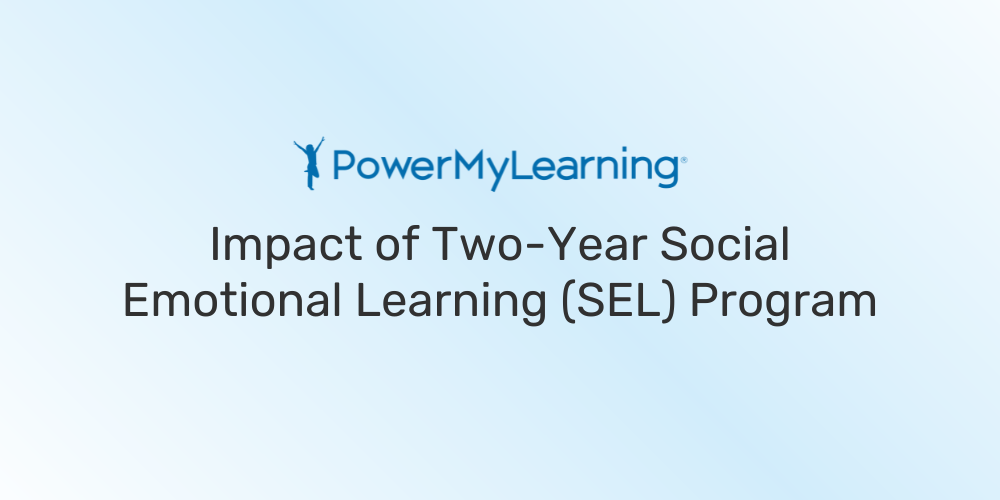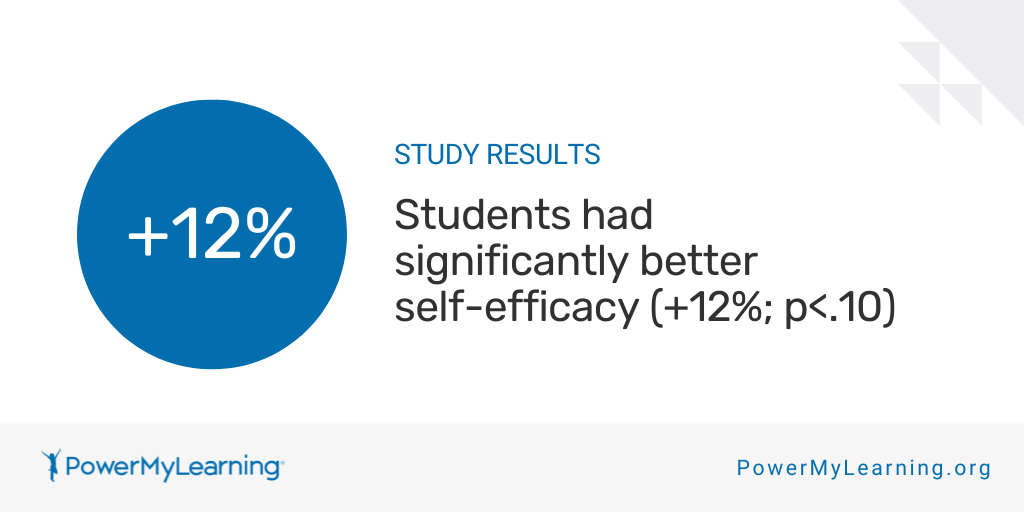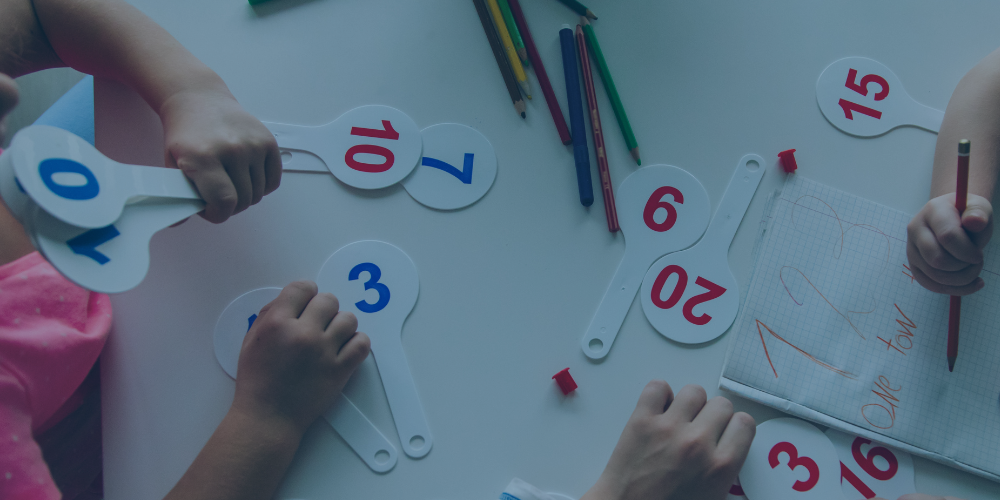Family Playlists Evidence Base
Updated: January 27, 2025
About Family Playlists
PowerMyLearning’s early grades math practice tool (“Family Playlists”) helps students master grade-level content through play-based learning and math discourse. Unlike tools that focus on "answer-getting," ours focuses on “sense-making” and offers teachers deep insights into students' mathematical thinking.
Students engage in interactive, curriculum-aligned learning games with a learning partner and then produce videos explaining what they learned. Teachers then use these videos and other data as formative assessment to tailor their instruction. Additionally, when paired with coaching, this tool can help teachers improve their math practice by enhancing their ability to identify common student misconceptions and on-grade-level discourse.
The tool was designed for grades K-2 to extend learning with a trusted adult outside of school time and was aptly named “Family Playlists.” We are now focusing on building out resources and supports for the tool to be used for in-class implementation and aging-up the tool to grades K-5 so we can scale use and deepen impact.
- Focus: Early grades (K-2); additional grades to be added in future school years
- Evidence rating: ESSA Level III Promising Evidence*
Current Evidence
Over the past several years, PowerMyLearning has conducted research studies examining the impact of Family Playlists on students’ academic skills and SEL competencies. These studies, summarized below, have provided evidence of a statistically significant impact of Family Playlists on both math learning and SEL skills.
Study #1:
PowerMyLearning evaluated the impact of its math professional learning program, including Family Playlists, on K-5 student math achievement in District of Columbia Public Schools (DCPS) during the 2023-24 school year. K-2 students and their families were assigned Family Playlists and K-5 teachers participated in the math professional learning program. The program significantly bolstered K-5 students’ math achievement across multiple metrics: i-Ready scale scores increased by 10.2 points (p<.001), 70% of students improved their grade placement level (p<.001), and 34% more students met or exceeded grade-level standards (p<.001). These gains were equally strong in predominantly Black schools, highlighting the program’s effectiveness in supporting historically marginalized communities. Furthermore, students struggling in math improved 4.5pp more than their peers, demonstrating the program’s potential to close achievement gaps.
PowerMyLearning (2025). Boosting K-5 Math Achievement with PowerMyLearning’s Early Math Program [White Paper]. PowerMyLearning. https://www.powermylearning.org/blog/k-5-math-achievement-analysis
Read "Boosting K-5 Math Achievement with PowerMyLearning’s Early Math Program"
Study #2:
PowerMyLearning examined the impact of Family Playlists and professional development on K-2 student math achievement at a partner school in New York during the 2023-24 and 2022-23 school years. Over the two years, the program significantly improved math achievement for all K-2 students (+12.9, p<.001) on the i-Ready math assessment. Notably, Black students (+15pp, p<.001), Hispanic students (+12.8pp, p=.01), and students with learning differences (+13.5pp, p=.03), all demonstrated significantly better math achievement. These findings highlight the program’s sustained impact on math achievement among high needs students.
PowerMyLearning (2025). Advancing Achievement for Struggling K-2 Math Learners [White Paper]. PowerMyLearning.
Read "Advancing Achievement for Struggling K-2 Math Learners"
Study #3:
PowerMyLearning examined the impact of Family Playlists and our Social Emotional Learning (SEL) professional development program on student math and SEL outcomes at a partner school in Brooklyn, New York during the 2022-23 and 2021-22 school years.
During the 2022-23 school year, K-2 students and their families were assigned Family Playlists and their teachers participated in the SEL program. Based on a pre/post analysis of students’ iReady math data, there was a statistically significant difference in the proportion of students who exceeded or met grade-level math achievement benchmarks before and after Family Playlists and the SEL program (+28pp, p<.001). There is also evidence that we are successfully reaching high needs students, including Black and Hispanic students. For Black students, the change in the proportion of students who exceeded or met district benchmarks before and after Family Playlists and the SEL program was significant (+31pp, p<.001). For Hispanic students there was also a significant difference in the proportion of students who exceeded or met math achievement benchmarks before and after Family Playlists and the SEL program (+22pp, p=.01).
During the 2021-22 spring semester, Kindergarten students and their families were assigned Family Playlists and their teachers participated in the SEL program. Findings from a pre/post analysis of DESSA SEL assessment data indicate that Family Playlists and the SEL program were related to significantly better SEL for Kindergarten students (+7%, p=.02, ηp2 =.02). When looking at specific SEL skills, these students had significantly better self-awareness (+28%, p<.001, ηp2 =.30), goal-directed behavior (+19%, p<.01, ηp2 =.19), optimistic thinking (+16%, p=.01, ηp2 =.17), and relationship skills (+15%, p=.02, ηp2 =.14).
James, K. Rocha, K., & Pandit, N. (2023). Impact of a Whole Child Approach to Math Instruction: SEL Program and Math Practice Tool. [White Paper]. PowerMyLearning.
Read the "Impact of a Whole Child Approach to Math Instruction" Study
Study #4:
PowerMyLearning conducted a short-cycle Randomized Control Trial (RCT) followed by a delayed Family Playlists implementation with both the control and implementation groups. This study focused on 67 Kindergarten students at a partner school in San Jose, California. Findings from the short-cycle RCT indicate that students in the implementation condition had significantly better self-efficacy (p=.04) and growth mindset (p=.07) compared to the control group. Findings from the pre/post analysis of the delayed implementation indicate that students’ SEL skills were significantly better for both the control group and the implementation group. After three weeks of Family Playlists, students in the control group had significantly better self-efficacy (p=.004), growth mindset (p=.01), self-management (p=.001), engagement (p=.001), and social awareness (p=.005) than before the implementation. After six weeks of Family Playlists, students in the implementation group had significantly better self-efficacy (p=.01) and growth mindset (p=.09). Only within and between condition simple effects from mixed Anovas are included here for simplicity. Results were considered statistically significant at the p ≤.10 level.
James, K. & Pandit. N. (2022). PowerMyLearning Family Playlists Impact Study. [White Paper]. PowerMyLearning.
Read the Family Playlists Impact Study
Study #5:
PowerMyLearning conducted short-cycle RCTs that were published with Project Evident with support from the Gates Foundation. This study focused on 6th grade students at a partner school in South Los Angeles, California. The study results indicated that, Family Playlists had a statistically significant positive impact on key SEL outcomes related to student agency, including intrinsic motivation, perceived competence, and perceived choice, as compared to standard homework assignments. Findings also showed that the positive impact of Family Playlists on SEL competencies was especially pronounced for English Language Learners (ELLs). In addition, ELL students reported a significantly better sense of belonging at school, agreement that the assignment helped their teacher better understand their family, and enjoyment of teaching (family vs self) in the Family Playlists condition than in the solo homework condition. All reported results were statistically significant at the p ≤ .05 level. This research was conducted on an earlier version of Family Playlists that targeted older students.
Martin, J. & Stock, E. (2021). Actionable Evidence in Education: Examining Family Playlists’ Impact on Student Social Emotional Learning and Science Mastery through Short-Cycle RCTs. [White Paper]. PowerMyLearning and Project Evident.
Read the Project Evident Case Study
Study #6:
The results of a quasi-experimental (QED) study indicated that students who were assigned Family Playlists had significantly better math achievement relative to a comparison group (p<.001; d=.33). This finding equates to four additional months of math learning. Math achievement was measured by the New York State standardized test. This study focused on 7th grade students at two partner schools in the Bronx, New York. The comparison group was students who had the same teacher at the same schools the prior school year. The comparison group was not assigned Family Playlists. This research was conducted on an earlier version of Family Playlists that targeted older students
PowerMyLearning (2018). Evidence of Family Playlists’ Impact on Math Achievement. [White Paper]. PowerMyLearning.
Read "Evidence of Family Playlists' Impact on Math Achievement"
Future Evidence
PowerMyLearning is in the third year of a prestigious Education Innovation and Research (EIR) Grant from the U.S. Department of Education. This project involves a large-scale Randomized Control Trial, which will provide even more robust evidence of the impact of Family Playlists on math and SEL outcomes among 1st and 2nd graders. This project will use What Works Clearinghouse (WWC) reviewable measures, such as the NWEA MAP and DESSA SEL Assessment. The study design and outcomes will be reviewed by the WWC and are designed to meet the WWC “without reservations” standards.



